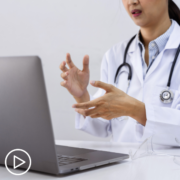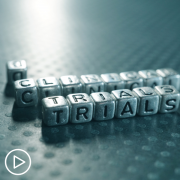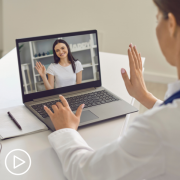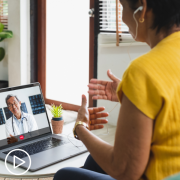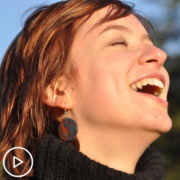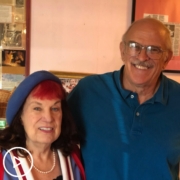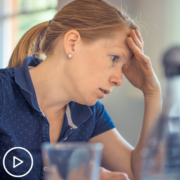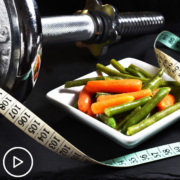MPN Patient and Care Partner Share Clinical Trial Experience from Patient Empowerment Network on Vimeo.
MPN Empowerment Leads Jeff and Summer share their experience participating in a COVID-19 clinical trial. Jeff believes that if you get an opportunity to participate in a clinical trial, you should take it. There are so many new medications in the pipeline for MPNs and you can help change the standard of care for future patients.
See More from Jeff & Summer
Transcript
Jeff:
Hi, I’m Jeff.
Summer:
Hi, I’m Summer and hi, I’m Zelda.
Jeff: And we’re your Network Empowerment Leads for the Patient Empowerment Network and we’re the leads for the myelofibrosis section, which Summer is a myelofibrosis patient. And we’re here today to talk to you about clinical trials. And we’ve had some experience, but what we’re going to tell you about today is not a trial that deals with myelofibrosis. But our experience in the COVID-19 vaccine trial for Moderna at University of California San Diego. And tell us about how it started, Summer.
Summer: Well, I’ve never been in a trial test before, and neither have Jeff. We went to UCSD, to where it’s conducted, and they were very friendly, very nice, very encouraging. But the strange thing, one of the things is I thought there’d be a huge waiting room. And they took us right in, and the whole time we were there, I didn’t see anyone other than the staff. So, I went in one of the rooms, and various doctors and nurses and assistants came in to take blood, to take my temperature, to ask me medical questions, things like that. The whole thing took probably about an hour and a half, and they were very encouraging. And then the last person that came in said, well, I’ll be back in a few minutes, and I’ll bring the vaccine in. So, I thought, oh, I guess I made it. But then when they came in, he said, no, you consulted with another doctor, because I have myelofibrosis that could slant the test. So, I wasn’t able to sign up and help people. But I do remember another thing about COVID. I was in the first group, because I’m older and have a disease, to get the vaccine. And I remember it was at Petco Park in San Diego, and there were so many people there that people had to park blocks from there. And that’s fine. Walking is no big deal. There were a lot of really old people that could barely walk, and they were going, I’ll never forget that.
And there was one woman that was very overweight. She was in a walker. The poor old thing could hardly walk. So, I remember I walked behind her the whole time, because I thought I can call for help if anything happens. But I still have that picture. And here’s Jeff’s view.
Jeff:
So, I went up with Summer to sign up for the vaccine test as well with UCSD. We thought we could make a difference and help. So, I went through the same, they gave everybody the same thing. Different doctors and nurses and assistants came in. They took your blood. They took your medical history and so forth. And then they went out of the room and left me there. And they came back in, just like Summer. And for me, they came back in with a hypodermic needle filled with vaccine or placebo. And they gave me the shot. And of course, they don’t tell you whether you had the placebo or the vaccine. And they sent me home. But before I went home, they had me load this little app onto my phone. And I have to fill it out every Sunday. I’ve been doing that now for about two and a half years, I guess. Whether you just got a couple of questions and you submit it. It’s part of their program. And they also periodically… I have to come back for other appointments. And they actually, of course, made a second appointment. So, I got the second shot in the Moderna combination. And they kept, each time I came back, they’d take blood. They wanted to see how the blood was forming antibodies, I guess. And so, I kept coming back. And they didn’t tell you what was happening until finally, I got an email that said the doctor was going to have a Zoom presentation or a web presentation. And basically, he came on and he gave the statistics that they had collected and said that the vaccine seemed to be working very well which was really nice to see. But we stayed in the… We would still stay with them because they wanted to see how long it lasted. And whether your antibodies would last.
So, I’ve been still going regularly. Eventually they gave us the third shot, the booster shot. And I haven’t had any word whether I’m supposed to have the next booster shot. I have an appointment with them in about two weeks to go. They call you back so they can check your blood. And presumably I might get another vaccine. So, it was a very interesting experience. And like Summer mentioned, I didn’t hardly ever see any people there except the staff. The place was clean. They were very, very friendly. It seemed to be well organized and run. And we felt happy. I felt happy to be part of the solution for COVID anyway. And that’s my experience.
So, our thought to you all was if you get an opportunity to participate in a trial, take it. Especially for those of you with myelofibrosis, there’s a lot of medicines coming down the pipe. They may need some people to be in trials. If you meet the requirements, go ahead and take it. It’s a worthwhile experience. And you can maybe be helping medicine. That’s it for this week. I’m Jeff.
Summer:
I’m Summer. I’m Zelda.
Jeff:
See you next time.
Summer:
Bye.

